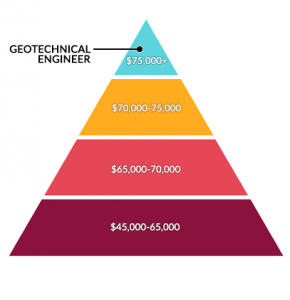Geotheta for Beginners
Geotheta for Beginners
Blog Article
Our Geotheta Statements
Table of ContentsThe Greatest Guide To GeothetaThe Single Strategy To Use For GeothetaThe Buzz on GeothetaThe Facts About Geotheta UncoveredThe smart Trick of Geotheta That Nobody is Discussing

They perform website investigations, collect samples, do research laboratory tests, and assess information to evaluate the viability of the ground for construction projects - Consulting Engineers. Based on their searchings for, geotechnical designers give referrals for structure layout, slope stability, preserving frameworks, and mitigation of geotechnical threats. They work together with other professionals, such as designers, architectural designers, and building and construction groups, to ensure that geotechnical considerations are incorporated right into the total project style and implementation
By analyzing the behavior and residential properties of soil and rock, they can identify possible geotechnical risks such as landslides, soil negotiation, or incline instability. Their expertise aids protect against failings or crashes that might threaten lives and property. Here are some detailed responsibilities and responsibilities of a geotechnical designer: Website Examination: Geotechnical designers conduct website examinations to collect information on subsurface conditions.
They interpret the data to comprehend the properties and behavior of the soil and rock, including their strength, leaks in the structure, compaction attributes, and groundwater problems. Geotechnical Analysis and Layout: Geotechnical designers analyze the information accumulated throughout website investigations to analyze the security and suitability of the website for construction tasks. They execute geotechnical estimations and modeling to examine aspects such as bearing capacity, negotiation, slope security, side earth pressures, and groundwater circulation.
The smart Trick of Geotheta That Nobody is Discussing
Structure Design: Geotechnical engineers play a critical function in creating foundations that can securely sustain the desired structure. They assess the dirt conditions and tons requirements to establish the suitable structure kind, such as shallow structures (e.g., grounds), deep foundations (e.g (https://www.mixcloud.com/geotheta/)., piles), or specialized techniques like dirt renovation. They think about aspects such as settlement restrictions, bearing capability, and soil-structure interaction to establish ideal foundation layouts
They assess building plans, display site activities, and conduct area examinations to validate that the design recommendations are adhered to. If unanticipated geotechnical problems arise, they examine the situation and supply recommendations for remediation or changes to the layout. Danger Analysis and Mitigation: Geotechnical engineers assess geotechnical hazards and dangers associated with the project site, such as landslides, liquefaction, or dirt erosion.

Partnership and Interaction: Geotechnical engineers function very closely with other experts associated with a task, such as architects, architectural designers, and building and construction teams. Reliable communication and cooperation are important to integrate geotechnical factors to consider into the total project style and building and construction procedure. Geotechnical engineers supply technical knowledge, solution inquiries, and make certain that geotechnical demands are fulfilled.
The Greatest Guide To Geotheta
Here are some kinds of geotechnical engineers: Structure Engineer: Structure designers specialize in developing and evaluating foundations for frameworks. They analyze the soil problems, tons demands, and site characteristics to figure out one of the most appropriate structure kind and layout, such as superficial structures, deep structures, or specialized strategies like pile foundations.
They examine the aspects affecting incline security, such as dirt properties, groundwater problems, and incline geometry, and develop techniques to avoid slope failures and reduce dangers. Earthquake Engineer: Quake engineers specialize in assessing and developing frameworks to withstand seismic pressures. They assess the seismic risk of a website, examine soil liquefaction potential, and create seismic design requirements to make sure the security and resilience of structures throughout quakes.
They perform area testing, gather samples, and analyze the collected data to characterize the soil properties, geologic developments, and groundwater problems at a site. Geotechnical Instrumentation Designer: Geotechnical instrumentation engineers concentrate on tracking and measuring the behavior of soil, rock, and frameworks. They install and preserve instrumentation systems that keep track of elements such as dirt settlement, groundwater degrees, slope motions, and architectural variations to evaluate efficiency and supply early cautions of prospective concerns.
The Buzz on Geotheta
They conduct tests such as triaxial tests, consolidation tests, direct shear examinations, and permeability examinations to collect information for geotechnical analysis and style. Geosynthetics Designer: Geosynthetics engineers concentrate on the design and application of geosynthetic materials, such as geotextiles, geogrids, and geomembranes. They make use of these materials to enhance dirt security, reinforce slopes, offer drainage solutions, and control erosion.
They often tend to be investigative individuals, which means they're intellectual, introspective, and curious. They are curious, systematic, logical, analytical, and logical. Some of them are likewise social, suggesting they're kind, generous, cooperative, individual, caring, useful, compassionate, sensible, and pleasant - Consulting Engineer.
In the workplace atmosphere, geotechnical engineers utilize specialized software program tools to carry out estimations, develop layouts, and analyze information. They prepare records, testimonial task specifications, connect with clients and employee, and coordinate useful source task tasks. The workplace setting offers a favorable setting for research, evaluation, and partnership with various other experts included in the job.
The Ultimate Guide To Geotheta
They frequently visit task websites to carry out site examinations, assess geotechnical problems, and gather data for analysis. These sees include taking a trip to different areas, in some cases in remote or difficult terrains. Geotechnical engineers may execute soil sampling, conduct examinations, and screen building and construction tasks to make certain that the geotechnical facets of the task are being implemented appropriately.
Geotechnical engineers likewise operate in specialized geotechnical research laboratories. In these centers, they conduct experiments, perform examinations on soil and rock samples, and evaluate the engineering properties of the materials. Geotechnical laboratory designers work thoroughly in these environments, dealing with testing devices, operating tools, and videotaping information. They team up with various other laboratory staff to ensure accurate and trusted screening results.
Report this page